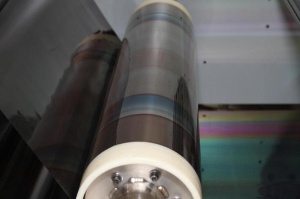Jun 8 2010
Solexant Corp., developer of third-generation ultrathin-film PV technology, today announced the $41.5M first close of a Series C financing round following the successful completion of a 2MW pilot line operating at the company’s headquarters.
The round, led by Olympus Capital Partners, includes two other new investors, DBL Investors and Birchmere Ventures, with strong support from existing investors Trident Capital, Firelake Capital, Medley Partners and X/Seed. Rami Elkhatib, general partner of Olympus Capital Partners, and Cynthia Ringo, managing partner of DBL Investors, will join Solexant’s board of directors.
 Solexant's roll-to-roll manufacturing technique allows for more efficient use of equipment space, as well as higher throughput and lower labor costs than competing thin film companies.
Solexant's roll-to-roll manufacturing technique allows for more efficient use of equipment space, as well as higher throughput and lower labor costs than competing thin film companies.
Solexant utilizes an extremely capital efficient “roll-to-roll” manufacturing technique to produce the industry’s first nanocrystal ultrathin-film solar cell. This method allows for more efficient use of equipment space, as well as higher throughput and lower labor costs than competing thin film companies. The company’s production process brings down the solar module manufacturing cost and total balance of systems (BOS) cost to below those of other thin film competitors.
“Solexant’s winning combination of breakthrough technology and manufacturing coupled with the management team’s ability to prove the commercial application of its nanocrystal ultrathin-film solar cell technology in a very capital-efficient way, impressed us immediately and maps ideally to our investment strategy,” said Rami Elkhatib, general partner of Olympus Capital Partners and new Solexant board member. “We’re very passionate about investing in sound companies like Solexant that can bring transformative solutions to important clean tech markets. With its unique thin film technology and cost-efficient production process, we’re confident Solexant will be a leader in the solar industry.”
Developed at Lawrence Berkeley National Lab (LBNL) by Dr. Paul Alivisatos and his team, Solexant’s printable nanocrystal technology platform can produce flexible thin films using a variety of materials through a fast and simple deposition process. Solexant’s first commercial products will be based on printed CdTe nanocrystals. The company plans to commercialize solar cells based on other higher efficiency printed nanocrystal materials over the next few years.
“Solexant’s innovative printed nanocrystal technology platform has the potential to deliver the lowest cost per watt in the solar industry,” said Damoder Reddy, CEO of Solexant. “During these uncertain economic times, our cost-effective and rapidly scalable manufacturing process attracted new investors, while retaining strong support from our existing investors. The expertise from the new investors and additions to the board will strengthen Solexant’s core team and help foster success as we move from R&D toward the commercialization phase.”
Solexant and LBNL have received numerous technology and manufacturing awards for nanocrystal solar cells, including the prestigious R&D 100 Award in 2009. The Solexant executive team has more than 100 years of combined experience in finance, manufacturing and R&D, and it also includes renowned nanoparticle scientists and deeply experienced thin film solar cell engineers.
Source: http://www.solexant.com/